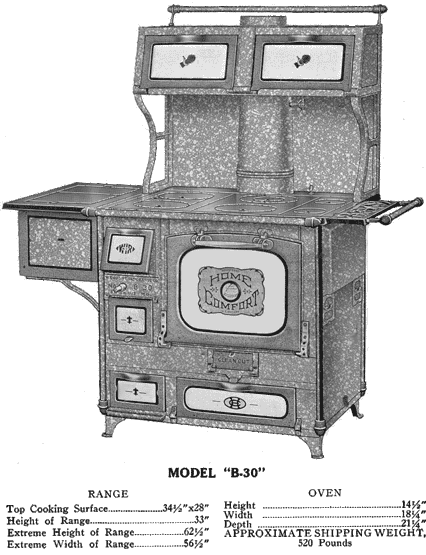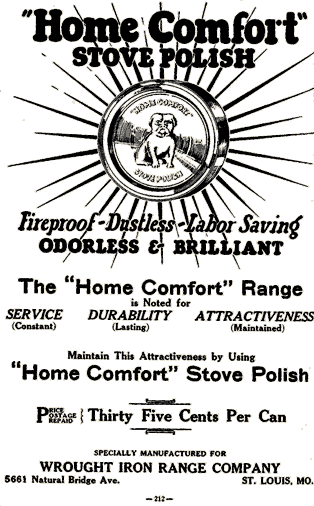My Grandma

The stove came with a very interesting cook book, which I inherited from my mother, to whom it had been given by my grandmother, who was unable to read it. Besides recipes, the cook book contains:
Pictures of the factory where the
stove was made
Pictures of all kinds of medals
and blue ribbons that their
stoves had won
Pictures of all of the models of
their stoves, 1893 to 1923 Page after page of testimonials
from very satisfied customers
from every state in the Union
all sounding as if written by the
same person
Directions for canning and preserving food
Household hints
Formulas for making all kinds of useful substances, from whitewash to paperhangers' paste
A perpetual calendar (see "Ropp's Perpetual Calendar, Updated")
A table for determining the number of days between specific dates
An illustrated parts list
A full-page ad for their stove polish (see
illustration below, left)

The stove was wood-burning.
The wood (harvested from the farm) was put into the
fire box through the upper small drop-down door just to the left of the
oven. Ashes fell or were shaken through an iron grate into a pan that
could be removed through the small door just below the fire box. The grate
was shaken using a handle with an opening that fit over the square rod
that protruded from the stove just below the fire box. This
 handle was also used to lift the cast iron stove lids, the little
hook on the end fitting into a slot on the lid (see illustration at right).
handle was also used to lift the cast iron stove lids, the little
hook on the end fitting into a slot on the lid (see illustration at right).
The reservoir of the stove in the illustration above is on the left-hand side, but my Grandma's was on the right. Water had to be pumped by hand in the pump house, carried into the house in pails, and poured into the reservoir.
When the men of the family came in from the fields and from milking in the evening, they used a large metal dipper to transfer heated water from the reservoir to an enamel basin, and carried it into the "wash room" where they "washed up" before supper. The wash room was fitted with a wooden wash stand to hold their wash basin, a roller towel, "wash rags" (actual rags, not purchased linens), a mirror, combs, shaving equipment, and a number of coat hooks from which hung fresh clothing for them to put on before coming to the table.
At the top of the stove were two warming ovens used to keep finished dishes hot until the entire meal was prepared, or until everyone was ready to sit down. When all had gathered at the table, I was always asked to say the prayer before meals.
I can remember Grandma making dried apples, rusks, and huge pans of bread, six loaves to a pan — even in summer, regardless of the heat and humidity. (Rusks are twice-baked bread. Slightly sweet loaves were baked, and then sliced and baked again until they were dry and crisp. Both the rusks and the dried apples were kept in cloth [flour] sacks in the pantry.)
When an animal was butchered (a process the children were never allowed to watch), Grandma rendered all the fat. If it was a pig, the lard was preserved in crocks in the cellar for use during the rest of the year. If it was a cow, the suet was also preserved for future use in certain kinds of recipes (mincemeat, for instance). The meat itself was cut up, cooked, and canned in glass "fruit jars." She also canned her home-grown vegetables and fruit.
The only "refrigeration" on the farm was what was called a "spring house." It was a stone cave that had been carved out of a hillside. It had stone troughs into which cold water from a natural spring was gravity circulated. Milk and cream in large metal cans specially made to contain these products were lowered into the water to be kept cool, as were butter crocks. Eggs were also kept in crocks in the spring house. However, in the hottest weather even the spring house didn't keep things very cool. Jello, for instance, always turned out a bit loose.
For many years Grandma did all of the laundry, including many pairs of denim "overalls," in metal tubs with a washboard and home-made soap. When finally someone bought her a washing machine, it had to be the kind powered by a gasoline engine because the farm had no electric power. Everyone was very relieved on wash day when the laundry was done, because the gas engine made a terrible racket (no muffler?) and smelled as bad as it sounded.
I always liked the days when Grandma churned butter. As with most other things, churning was done by hand, and I was allowed to taste the cream or butter that stuck to the handle as she lifted and lowered it. The only disappointment was that it tasted quite flat because it had no added salt at that point.
Every day the eggs had to be gathered from places selected by unpredictable hens, most of which chose to avoid the cubicles provided for them in the chicken coop. One of their favorite places was an old touring car — the kind with a cloth top and isinglass windows. Another was the nooks and crannies of the farm machinery parked in the "machine shed." The daily egg hunt became the job of any children who happened to be visiting.
I remember looking on, horrified, as Grandma caught chickens, held them by the legs, and whacked off their heads with an ax on a chopping block. After she put them down, they ran around for a while sans heads. It wasn't hard for me to figure out what it meant for one to be "running around like a chicken with its head cut off."
Two things I remember quite clearly about Grandma's farmhouse. One was the lightning rods fastened to the roof ridges and chimney. In the hills of that area in Wisconsin the electrical storms were especially fearsome events. When there was a storm, my mother always burned palms (brought home on Palm Sunday) and prayed for protection from it. That and the lightning rods made me feel quite secure. (Years later I found out that lightning rods are not only ineffective, but actually increase the risk of lightning strikes.)
My other clear memory is of spending hours in the attic poring through the school books left over from the education of my mother and her seven brothers and sisters. Any books I wanted, Grandma always gave me to keep.
Saturday afternoon was usually reserved for shopping for staples (such as flour and sugar) in town, the closest town being Independence, Wisconsin. At the dry goods store Grandma's "goods" (fabric) was measured on the clerk's arm outstretched to the side. A one-yard measure was the distance from her nose to her hand. (Too bad if you got a short-armed clerk!) Grandma's brother (my great uncle Pete) always bought lemon drops (a hard candy dipped in sugar), and only lemon drops, which he shared with me. Lemon was not my favorite flavor, but it was candy and I liked sweets.
On Sunday we sometimes attended the tiny mission church on Montana Ridge, just a short distance from the farm, where all the reposed members of the family were buried in the churchyard. If the priest was not coming to the mission that weekend, we went to Saints Peter and Paul (Roman Catholic) Church in Independence. I loved going to that church because of its beauty, its size, its comfortable homey atmosphere, and the friendly people. I remember that men and women occupied separate sides of the nave. I could never have even imagined then that some day I would have Saints Peter and Paul Orthodox Mission in my home in Tucson. Is that coincidence or what?
I really loved my Grandma. Besides being a very loving person, she kept her promises. No one else from my childhood ever did. I was going to add "except my mother," but then I realized that my mother never made promises. If they thought about it at all, those who did make them probably didn't think that a child would remember. They didn't, but Grandma and I did.
